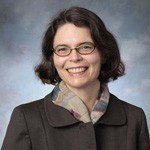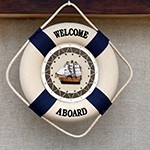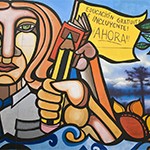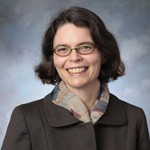 Does it seem like you have more students in your classes who have an Accessible Education Services (AES) accommodation plan? Your intuition is correct, and it’s not just you, according to AES manager Melanie Gangle. Accessible Education Services is experiencing slow but steady growth, and is currently serving over 350 students with disabilities. This equals about 8.5 percent of the student population, and the vast majority of these students experience a non-apparent disability. The following resources and tips from AES are designed to support faculty in facilitating accommodations and accessibility in your teaching.
Does it seem like you have more students in your classes who have an Accessible Education Services (AES) accommodation plan? Your intuition is correct, and it’s not just you, according to AES manager Melanie Gangle. Accessible Education Services is experiencing slow but steady growth, and is currently serving over 350 students with disabilities. This equals about 8.5 percent of the student population, and the vast majority of these students experience a non-apparent disability. The following resources and tips from AES are designed to support faculty in facilitating accommodations and accessibility in your teaching.
Did you know that Accessible Education Services has a Faculty Toolbox in PilotsUP for faculty regarding AES accommodations for students? Here you will find information on faculty responsibilities regarding accommodations, as well as tips on facilitating accommodations working with students with specific types of disabilities.
Are you looking for more general resources to support student learning in your course? Given the nation-wide growth in clinically significant anxiety and depression among college students, Kristel Gallagher and Shevaun Stocker developed a Guide to Incorporating Social-Emotional Learning in the College Classroom, which features a curriculum containing short weekly activities for students to complete outside of class (apart from an initial activity for the first class day), suitable for adapting and adding to any course curriculum. These activities are based on exercises from the Greater Good in Science Center’s website, based at UC Berkeley.
Do you have questions about accommodations for a specific student in your class? Please reach out to Gangle at gangle@up.edu, or Susan Ayres, AES access counselor, at ayres@up.edu for information and technical assistance regarding student-related accommodation questions.
 Did you know that the majority of students with accessible education services (AES) accommodations have either a learning disability (LD), or attention deficit/hyperactivity disorder (ADHD), or both LD and ADHD? These two articles discuss the benefits of utilizing a growth mindset approach when teaching students who experience ADHD and LD. The surprise? These same growth mindset and universal design strategies also benefit learning outcomes for students without disabilities.
Did you know that the majority of students with accessible education services (AES) accommodations have either a learning disability (LD), or attention deficit/hyperactivity disorder (ADHD), or both LD and ADHD? These two articles discuss the benefits of utilizing a growth mindset approach when teaching students who experience ADHD and LD. The surprise? These same growth mindset and universal design strategies also benefit learning outcomes for students without disabilities. Incorporating Universal Design into a course is an iterative process, much like course design itself. Continually utilizing feedback and ideas from colleagues, class discussion, and the literature to modify and enrich learning experiences provides greater opportunities for all students to access course content, regardless of learning modality preference. UC Berkeley’s Instructional Design Community focused on Universal Design and shared
Incorporating Universal Design into a course is an iterative process, much like course design itself. Continually utilizing feedback and ideas from colleagues, class discussion, and the literature to modify and enrich learning experiences provides greater opportunities for all students to access course content, regardless of learning modality preference. UC Berkeley’s Instructional Design Community focused on Universal Design and shared  The Shepard Academic Resource Center is pleased to announce that Lisa Deneen has joined Accessible Education Services (AES) as an access counselor. In her new role, Lisa assists students in effectively utilizing their AES accommodations, and provides students, faculty, and staff with technical advice, problem-solving assistance, and procedural guidance regarding AES accommodations and policies. You are invited to stop by the AES office in BC 163 to welcome Lisa to campus. Questions? Please contact Melanie Gangle at
The Shepard Academic Resource Center is pleased to announce that Lisa Deneen has joined Accessible Education Services (AES) as an access counselor. In her new role, Lisa assists students in effectively utilizing their AES accommodations, and provides students, faculty, and staff with technical advice, problem-solving assistance, and procedural guidance regarding AES accommodations and policies. You are invited to stop by the AES office in BC 163 to welcome Lisa to campus. Questions? Please contact Melanie Gangle at  Feeling fresh from summer’s rest, research, and writing? The new academic year provides new opportunities to design or redesign courses to increase support for student learning. Nationally, more faculty, departments, and institutions are adopting Universal Design for Learning (UDL) strategies to provide students with multiple pathways to learn, individualized opportunities to demonstrate course competencies; and communities of learners to support individual and collective student learning outcomes. To learn more, please check out the “
Feeling fresh from summer’s rest, research, and writing? The new academic year provides new opportunities to design or redesign courses to increase support for student learning. Nationally, more faculty, departments, and institutions are adopting Universal Design for Learning (UDL) strategies to provide students with multiple pathways to learn, individualized opportunities to demonstrate course competencies; and communities of learners to support individual and collective student learning outcomes. To learn more, please check out the “ Participation in faculty-led study abroad courses, programs and experiences provides outstanding ways for UP students to deepen their understanding of discipline-specific content in an international context. Are you thinking of creating a faculty-led study abroad program or course (or have you already created one)? It is important to plan for accessibility while creating your course or program. Melanie Gangle, program manager for Accessible Education Services (AES), is glad to consult with you in partnership with Eddie Contreras, director of studies abroad, in order to design a faculty-led abroad experience to be as inclusive as possible, and accessible for students with many different types of disabilities. Interested in learning more? Check out
Participation in faculty-led study abroad courses, programs and experiences provides outstanding ways for UP students to deepen their understanding of discipline-specific content in an international context. Are you thinking of creating a faculty-led study abroad program or course (or have you already created one)? It is important to plan for accessibility while creating your course or program. Melanie Gangle, program manager for Accessible Education Services (AES), is glad to consult with you in partnership with Eddie Contreras, director of studies abroad, in order to design a faculty-led abroad experience to be as inclusive as possible, and accessible for students with many different types of disabilities. Interested in learning more? Check out  You may have noticed more service dogs being used by people with disabilities in stores, in airports, at neighborhood meetings, and even on campus. Are you curious about what differentiates a service dog from a pet? Take a quick break and watch this enjoyable
You may have noticed more service dogs being used by people with disabilities in stores, in airports, at neighborhood meetings, and even on campus. Are you curious about what differentiates a service dog from a pet? Take a quick break and watch this enjoyable  Would you like to increase the pathways through which your students interact with your course material?
Would you like to increase the pathways through which your students interact with your course material?  Do you wonder why some students eligible for accommodations through accessible education services (AES) do not actually use their accommodations? According to Melanie Gangle, accessible education services, in a recent
Do you wonder why some students eligible for accommodations through accessible education services (AES) do not actually use their accommodations? According to Melanie Gangle, accessible education services, in a recent 